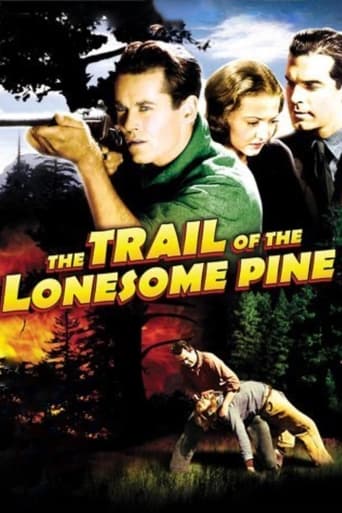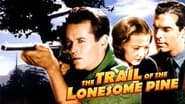dougdoepke
The movie's an affecting tale of feuding backwoods families, who must also make adjustments to encroaching modern world. I was expecting a Romeo-Juliet situation with the families, but that's surprisingly not the case. Instead June (Sidney) has to decide between her cousin Dave (Fonda) and outsider Hale (MacMurray). Tradition favors Dave, but her heart favors Hale. At the same time, railroad developers are crossing land owned by each family, and neither the Tollivers nor the Falins wants to accommodate their hereditary enemy. They'd rather shoot each other if they get the chance. And who knows how the enmity started, except now it's part of both families' tradition. If the movie's flawed, it's with the use of of popular backwoods stereotypes.Apparently this was the first outdoor Technicolor feature (IMDB), but you'd never know it. Visually the film is quite striking, with a lot of beautiful outdoor compositions. Also, you'd never guess these were filmed just 35-miles east of LA in the San Bernardino mountains. The acting too is first-rate—a soulful Sydney, an ornery Fonda, and an underrated MacMurray. Then there's Sherlock Holmes' favorite Dr. Watson, Nigel Bruce, in a non-comedic role. Needless to say, that took some adjustment for this old Sherlock fan. In fact, there're a couple other unexpected cast members, as well: Little Rascal Spanky McFarland and comedic Fuzzy Knight. And, of course, mustn't forget everyone's favorite hard-scrabble mom, Beulah Bondi, as the long-suffering ma Tolliver.I like the way the movie works the culture clash between tradition and modernity into the plot. The railroad company pays big money for land use, and that along with a railway to service the expected coal deposits, is bringing the backwoods into the modern age, as June's evolution shows. Of course, not everyone's supportive of change, particularly dad Tolliver (Stone). The movie has some uncommonly poignant moments, especially that final sequence, which conveys an extraordinary emotional power. As a kid, I recall bawling at it, and even now as a geezer, it brought a tear to the eye. As I see it, Fuzzy and his dog are mourning not only friends but the passing of a simpler way of life.All in all, the movie is surprisingly good, with a strong story, commanding visuals, and a thoughtful subtext. So don't pass it up because of a relative obscurity.
weezeralfalfa
First, I would like to note the striking similarities of the plot of this film with that of the later "The Big Country" western. Both dealt with a running feud between two extended families, involving illiterate backwoodsmen near the border of VA and KY in the present film, and two cattle-ranching families in the Wild West in the other film. Although not hinted in either film(probably to avoid offending significant portions of audiences), one of the families had an Irish-derived name, while the other had an English or Scottish-derived name, suggesting that ethnic and religious bigotry was the root of their traditional hatred for each other. In each film, the story dealt mainly with the non-Irish family, while the Irish family is characterized as the more uncouth. The English or Scottish family is the recipient of an enlightened outsider, who becomes romantically involved with the most eligible daughter of the clan. The outsider finally forces the feuding families to cooperate to some degree(over water rights in one case, and over building a railway to carry out coal in the present case), and to end their vendetta cultures, but not until after further bloodshed instigated by the outsider's presence.A young Henry Fonda plays the tragic Dave Toliver who, near the beginning of the film, is laying down with a Falin bullet in his shoulder and ends the film laying down with another Falin bullet or two in him.Through most of the film, he represents a young generation of hotheads who want to continue their life of backwoods primitiveness and clan feuding. In contrast, coal mining engineer Jack Hale(Fred MacMurray) represents the enlightened outside world. He wants to open coal mines and build a railroad to take it out on lands of both clans, requiring the grudging cooperation of the clans. At first, most don't like it, but eventually both families sign an agreement, despite the continued disapproval of some. Meanwhile, Hale interests Dave's cute girlfriend, June Toliver(Sylvia Sydney) in getting an education in far off Louisville. Clearly, she is gradually warming up to him as a possible alternative to Dave. Also, her much younger brother Buddie(Spanky MacFarland) is much interested in the machinery involved in building the railway and announces he wants to become an engineer. Tragically, someone(presumably a Falin) blows up the steam shovel he is playing on. Was this meant as sabotage?, murder? or both? Everyone emphasizes the murder aspect, which leads to a new round of threats and shootings. Hale feels indirectly responsible. He, Dave and a devastated June vacillate as to whether to go shoot some Falins in retaliation. The elderly sheriff of the nearby village of Gaptown, and Melissa(Beulah Bondi), Daves mother, voice their strong advice that the young folk not go hunting Falins to shoot. The dramatic last 15 minutes of the film brings some resolution to the major plot conflicts, but I was disappointed with the finale scene. Strangely, despite occasional songs sung by the eccentric Tater(Fuzzy Knight), the established song "Trail of the Lonesome Pine", is barely included, as one of several background pieces in the opening credits. The lyrics begin 'In the Blue Ridge Mountains of Virginia'. Well, the story location, as well as the officially designated Trail of the Lonesome Pine, are quite west of the actual Blue Ridge Mountains, which form the eastern-most significant mountain range along the southern Appalachians. There's no coal in those mountains. Their rocks are geologically much more related to those of the Piedmont, to the east, than to the sedimentary rocks found on the Appalachian Plateau, where this story takes place, as well as those in the intervening Valley and Ridge geographical region.Evidently, the lyricist for this song was ignorant of or didn't care about the actual geographic regions of SW Virginia! Thus, the song in the film "When it's Twilight on the Trail" is perhaps a more appropriate theme song.You may find the attitude of the Gaptown sheriff toward the killings and sabotage disturbing. Along with Melissa, he felt that attempts to retaliate against the Falins for Buddie's death by killing them or arrests would merely provoke more violence. This is an age-old problem, with no simple answer than works out well in all situations. It is still quite relevant in the US today, to say nothing of the rest of the world, especially as relates to organized criminal gangs, domestic disputes and violence, and to growing and trafficking illegal drugs. Unfortunately, governments don't recognize private wars as being legally equivalent to wars waged by governments. Thus, killers and avengers are treated alike as murderers, not as heroes or victims. Our prisons are filled with criminal gang members who continue their wars there. The sheriff clearly didn't agree with this policy.A gorgeous Paramount Technicolor production, reportedly the first three-strip outdoor Technicolor film.
bkoganbing
This sound version of The Trail of the Lonesome Pine is actually the fourth and to date last version of this story. There were three silent films made from this novel by John Fox, Jr., including one done in 1916 by Cecil B. DeMille.It's the story of a couple of Appalachian Mountain families who've had a decades old feud in which no one can quite recall how it all got started, but they sure do remember the latest outrage by the other crowd. There's a great temptation to treat this all humorously and it certainly has been done, I can recall Abbott and Costello's Comin' Round the Mountain with the same plot premise. But whole people's and whole nations act this way, who are we to judge the Tollivers and Falins of this story.Sylvia Sidney and Henry Fonda are two Tolliver cousins, kissing cousins as they say in the mountains, distant enough to contemplate marriage. Into the picture comes railroad man Fred MacMurray who wants to build a railroad through the properties of both families. He interests Sylvia who starts to see that there is a whole world away from her family and their feud.Of course when her little brother is killed the whole ugly business starts up again and it leaves tragedy again in both families.The Trail of the Lonesome Pine has its place in film history as the first outdoor as opposed to studio film shot in three strip technicolor. Color which is now standard was a big gimmick back in the day and Paramount raked in good box office.Fuzzy Knight plays another rustic character, kind of a Tolliver satellite and he sings a couple of songs written for the film by Louis Alter and Sidney Mitchell, Twilight on the Trail and A Melody from the Sky. The latter got an Academy Award nomination for Best Song, losing to The Way You Look Tonight. The former however got a recording by Bing Crosby. This is a perfect example of the connection of film, and radio, and the recording industry. Bing was Paramount's number one box office attraction and the Paramount executives no doubt prevailed on him to record the song and sing it on his brand new Kraft Music Hall Radio Show in the interest of publicizing The Trail of the Lonesome Pine. Fred MacMurray and Sylvia Sidney were also with Paramount at the time and Henry Fonda was at that time under contract to producer Walter Wanger who filmed this story. Those were the days way before agents and stars being their own producers. Such cozy arrangements as these were more easily done then.This last to date version of The Trail of the Lonesome Pine probably is too old fashioned for a remake. Still I think today's audiences might still enjoy it.
overseer-3
I bought a video of this film on Amazon.com after reading the 1908 novel by John Fox Jr. and enjoying it very much. I waited 4 whole months for Amazon to locate a copy and ship it to me. Then I settled down to watch it and almost fell asleep. I was disappointed after all that wait.Sylvia Sidney and Fred MacMurray were terribly miscast as the leads June and Jack, Fred more so than Sylvia. Henry Fonda was very good as Dave, although his lines were hokey. The script was not true to the book at all; that was the main problem. All the protective tenderness the lead male Jack felt for the girl June, so beautifully portrayed in the novel, was totally missing in Fred MacMurray's performance. And then to top it off they had little Spanky from the Our Gang series in it as the little brother of June, his chubby face and coy demeanor were distractions from the main action of the story. The songs that were sung were annoying too; had no place in the story. It would have been better if they had spent money on a better musical soundtrack without characters singing all the time, especially in dramatic scenes. What were they thinking? (no doubt, of sheet music sales). Some outdoor scenes were beautiful filmed in color but that alone cannot hold the viewer's interest in the movie. Even the significance and symbolism of the Pine Tree in June and Jack's relationship wasn't portrayed in the film as it should have been.Anyway, my advice here is to skip the film and just read the book and enjoy it. Since this story is in the public domain it could really be updated today and make a nice film. Maybe someday some studio or independent filmmaker will consider it. There were 4 silent versions and an animated version made prior to this film, so obviously the story is a classic one that can be enjoyed by new generations, if told well and with sensitivity and faithfulness to the book by John Fox.





